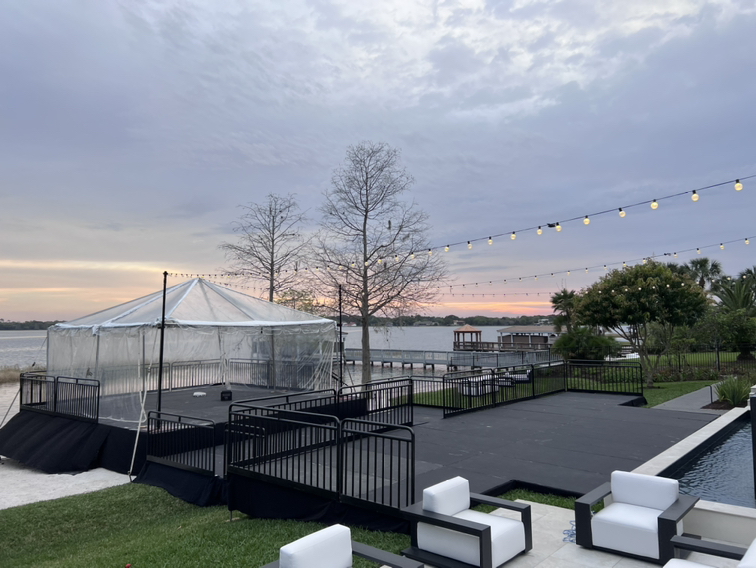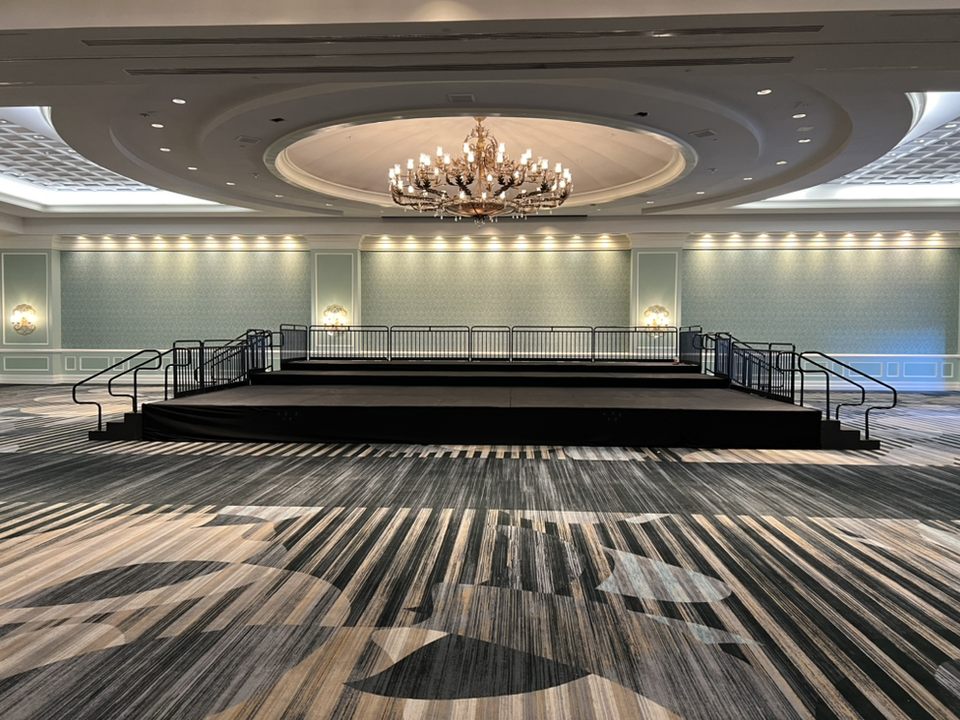Planning a big event can feel like a monumental task, but with the right preparation, you can ensure that everything goes off without a hitch. Whether you’re organizing a large corporate event, a wedding, or a music festival, there are a lot of moving parts to manage. In this guide, we’ll walk you through everything you need to consider – from budgeting to to securing the best staging solutions for large events.
1. Set a Realistic Budget
The first step to planning any successful event is creating a realistic budget. Large events can easily go over budget if you’re not careful, so it’s crucial to break down every potential expense. Think about costs for the venue, catering, entertainment, transportation, decor, and, most importantly, event stage setups.
How to create a budget:
- List all potential costs in categories (venue, food, entertainment, etc.)
- Get quotes from vendors early so you can have accurate numbers.
- Set aside a portion of your budget for unexpected expenses.
Don’t forget that staging solutions for large events and AV equipment are often necessary for larger events. You’ll want to ensure your budget can cover these important components as well.
Pro Tip: Include a 10-20% buffer in your budget for unplanned expenses. This ensures that if something comes up last-minute, you’re prepared financially and can make adjustments as needed.
2. Choose the Right Venue
Your venue choice is a major factor in the success of your event. The right venue sets the mood and ensures your guests have enough space to move around comfortably. Whether your event is indoors or outdoors, the venue should align with your event’s theme and provide adequate support for vendors and equipment, especially when you’re arranging stage hire for larger events.
Key things to consider when selecting a venue:
- Capacity: Make sure the venue can comfortably accommodate your guests.
- Location: Choose a venue that’s easy for your attendees to get to.
- Amenities: Does the venue offer enough parking, restrooms, and catering options?
- Accessibility: Ensure the venue is accessible for people with disabilities, including entrances, seating areas, and restrooms.
Also, consider whether the venue can handle the technical needs of your event, such as electricity for lighting and sound systems. It’s essential to check if the venue can accommodate stage rentals, lighting rigs, and other equipment.
Pro Tip: If your event is outdoors, make sure the venue has contingency plans in place. Weather conditions can change quickly, and it’s important to have options for covering your stage or moving indoors if necessary.
3. Lock Down Your Event Date Early
One of the first steps in planning your event is to secure a date. Popular venues and vendors can book up months (or even a year) in advance, so locking in your event date should be a priority. Once you have a date, you can start booking the other essentials like the stage rental, entertainment, and catering.
What to consider when setting the date:
- Does your chosen date conflict with other major events or holidays that could affect attendance?
- Does the date give you enough time to plan and promote the event effectively?
- Will your key vendors, including stage rental companies, be available on that date?
Finalizing your event date early allows you to work out the logistics well in advance. You can also build a timeline for your event, so you know when key tasks need to be completed.
4. Select the Right Stage for Your Event
The stage is often the centerpiece of large events, so choosing the right stage rental is crucial. Whether it’s a live performance, keynote speech, or awards ceremony, the stage you choose should fit the needs of your event and venue.
Considerations when choosing a stage rental:
- Size: The stage should be large enough to accommodate performers, speakers, or presentations without feeling cramped. At the same time, avoid choosing a stage that’s too big for your space or audience.
- Height: The height of the stage impacts visibility for the audience. If you’re hosting an event for a large crowd, a taller stage ensures everyone can see the action.
- Stage Surface: For outdoor events, consider stages with weather-resistant surfaces. Non-slip surfaces are also essential for safety, especially if you have performers moving around on stage.
Also, check with the stage rental company to see if they offer additional services such as stage setup, breakdown, and on-site support.
Pro Tip: Ask your stage rental provider if they offer customizable stage designs that match the theme of your event. A tailored look can enhance the aesthetic appeal of the stage and tie it into your overall event decor.
5. Plan Your AV and Lighting Setup
Good sound and lighting are essential for any large event. The quality of your AV (audio-visual) setup can make or break the experience for your guests. Whether you’re hosting a concert, conference, or wedding, clear sound and proper lighting are nonnegotiable.
Tips for sound and lighting:
- Sound system: Invest in high-quality speakers, microphones, and mixing boards to ensure that everyone can hear clearly. Test the sound system before the event to avoid any issues.
- Lighting: Lighting sets the mood and can direct attention to key moments, such as performances or speeches. Stage lighting, in particular, is important for making sure the main action is well-lit and visible to all attendees.
When booking your stage rental, ask if they offer packages that include lighting and sound equipment. Many stage rental companies provide this service, which can simplify your planning process.
Pro Tip: For outdoor events, make sure you have power backup options in case of electrical issues. Having a generator on hand can be a lifesaver if anything goes wrong.
6. Coordinate with Vendors Early
Working with multiple vendors can be one of the most challenging aspects of planning a large event. From the caterers to the AV team, everyone needs to be in sync. Start communicating with vendors early to ensure everything is in place well before the big day.
Vendor coordination tips:
- Send a detailed event timeline to all vendors so they know when they need to arrive, set up, and break down.
- Schedule a final walkthrough with all vendors to review logistics like the stage setup, lighting, and sound.
- Make sure you have a primary point of contact for each vendor in case any issues arise on the event day.
Pro Tip: Create a checklist of all vendors and what they’re responsible for to avoid any last-minute confusion.
7. Plan for Accessibility and Comfort
A well-planned event takes into account the needs and comfort of all attendees. Ensure that your event is accessible to people with disabilities, whether that means providing ramps for your stage or ensuring that there are accessible restrooms.
Additional comfort tips:
- Provide adequate seating for guests, especially for longer events.
- Make sure there are shaded areas or tents for outdoor events to protect guests from the sun.
- Offer hydration stations where guests can grab water, especially for outdoor events.
When it comes to your stage rental, check that the stage is accessible for performers or speakers who may need ramps or other accommodations.
8. Promote Your Event Effectively
No matter how well you plan, your event won’t be a success if people don’t know about it. A solid promotion strategy ensures you get the word out and draw in your target audience.
Event promotion tips:
- Leverage social media: Create event pages on platforms like Facebook and Instagram to share updates, event details, and promotions.
- Use email marketing: Reach out to your audience with event invites, reminders, and exclusive updates.
- Partner with influencers or community leaders who can help spread the word.
9. Have a Backup Plan
Even with perfect planning, sometimes things go wrong. Weather, technical issues, or unexpected vendor cancellations can throw a wrench in your plans. That’s why it’s important to always have a backup plan in place.
Common backup plans:
- Outdoor events: Have an indoor alternative or tent ready in case of bad weather.
- Stage rental issues: Confirm with your rental company that they have replacement equipment in case of any stage issues.
Final Thoughts
With these tips, you’ll be well-prepared to handle every detail for your event. Remember, the key to a successful event is preparation and flexibility. And if you need any help with stage rentals or AV setups, we’re here to help!
Looking to book your stage rental for your next big event?
Contact us today to learn more about our services.

